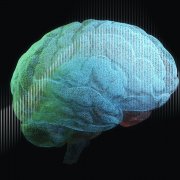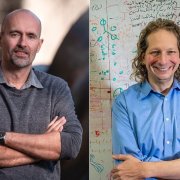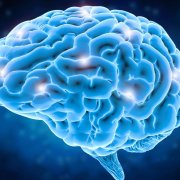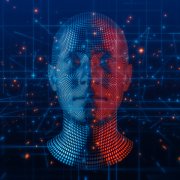December 13, 2023 - 1:00 pm
Study shows computational models trained to perform auditory tasks display an internal organization similar to that of the human auditory cortex.
Anne Trafton | MIT News
Computational models that mimic the structure and function of the human auditory system could help researchers design better hearing aids, cochlear implants, and brain-machine interfaces. A new study from MIT has found that modern computational models derived from machine...
December 7, 2023 - 2:30 pm
McGovern Seminar Room (46-3189)
Daniel Mitropolsky, Columbia University
Abstract: How do neurons, in their collective action, beget cognition, as well as intelligence and reasoning? As Richard Axel recently put it, we do not have a logic for the transformation of neural activity into thought and action; discerning this logic as the most important future direction of...
December 5, 2023 - 4:00 pm
Singleton Auditorium (46-3002)
Daniel Wolpert, Columbia University
Abstract: Humans spend a lifetime learning, storing and refining a repertoire of motor memories appropriate for the multitude of tasks we perform. However, it is unknown what principle underlies the way our continuous stream of sensorimotor experience is segmented into separate memories and how we...
December 5, 2023 - 12:00 pm
Robots that can fit multiple items into a limited space could help pack a suitcase or a rocket to Mars
By Nick Hilden
Packing the car for a road trip might seem like a straightforward enough task, but it’s never been an easy one for robots to learn—until a new study turned the robot training over to artificial intelligence. The implications of this research go far beyond a well-packed trunk and could eventually impact things ranging from how we...
December 4, 2023 - 4:00 pm
Singleton Auditorium (46-3002)
Dylan Hadfield-Menell (CSAIL)
Abstract: For AI systems to be safe and effective, they need to be aligned with the goals and values of users, designers, and society. In this talk, I will discuss the challenges of AI alignment and go over research directions to develop safe AI systems. I'll begin with theoretical results that...
November 29, 2023 - 3:30 pm
Rodney Brooks, co-founder of iRobot, kicks off an MIT symposium on the promise and potential pitfalls of increasingly powerful AI tools like ChatGPT.
Adam Zewe | MIT News
Speaking at the “Generative AI: Shaping the Future” symposium on Nov. 28, the kickoff event of MIT’s Generative AI Week, keynote speaker and iRobot co-founder Rodney Brooks warned attendees against uncritically overestimating the capabilities of this emerging technology, which...
November 20, 2023 - 11:00 am
Jörn Dunkel and Surya Ganguli ’98, MNG ’98 receive Science Polymath awards; Josh Tenenbaum is named AI2050 Senior Fellow.
Sandi Miller | Department of Mathematics
Two MIT faculty were recently honored by Schmidt Futures, a philanthropic initiative of Eric and Wendy Schmidt. MathWorks Professor Jörn Dunkel received the 2023 Schmidt Science Polymath award, and professor of computational cognitive science Josh Tenenbaum was named a Schmidt...
November 14, 2023 - 4:00 pm
Singleton Auditorium (46-3002)
Peter Dayan, Max Planck Institute for Biological Cybernetics
Abstract:
Much existing work in reinforcement learning involves environments that are either intentionally neutral, lacking a role for cooperation and competition, or intentionally simple, when agents need imagine nothing more than that they are playing versions of themselves or are happily ...
Much existing work in reinforcement learning involves environments that are either intentionally neutral, lacking a role for cooperation and competition, or intentionally simple, when agents need imagine nothing more than that they are playing versions of themselves or are happily ...
November 7, 2023 - 4:00 pm
McGovern Reading Room (46-5165)
Pouya Bashivan, McGill University
Abstract:
Across the primate neocortex, neurons that perform similar functions tend to be spatially grouped together. How such organization emerges and why have been debated extensively, with various models successfully replicating aspects of cortical topography using cost functions and learning...
Across the primate neocortex, neurons that perform similar functions tend to be spatially grouped together. How such organization emerges and why have been debated extensively, with various models successfully replicating aspects of cortical topography using cost functions and learning...
October 31, 2023 - 2:15 pm
Mini-clocks in the human brain? UCLA researchers show how certain neurons fire with minute-scale regularities
by University of California, Los Angeles (UCLA), Health Sciences
Two studies led by UCLA researchers offer new insights into the way neurons in the human brain represent time and space – the most basic ingredients of consciousness of human existence and the primary dimensions of experience that allow us to reconstruct the past and...
October 30, 2023 - 2:00 pm
Two studies find “self-supervised” models, which learn about their environment from unlabeled data, can show activity patterns similar to those of the mammalian brain.
Anne Trafton | MIT News
To make our way through the world, our brain must develop an intuitive understanding of the physical world around us, which we then use to interpret sensory information coming into the brain.
How does the brain develop that intuitive understanding? Many...
October 19, 2023 - 11:30 am
Perovskite silicon tandem solar cell technology is a mouthful, but it’s basically perovskite crystals layered on top of silicon cells. The combination captures energy from the sun more efficiently than traditional silicon cells, creating powerful solar panels. That sounds simple enough, but designing an efficient perovskite silicon tandem solar cell isn’t easy because of its multi-layer architecture. A Singapore-based company called Cosmos...
October 17, 2023 - 2:00 pm
Researchers coaxed a family of generative AI models to work together to solve multistep robot manipulation problems.
Adam Zewe | MIT News
Anyone who has ever tried to pack a family-sized amount of luggage into a sedan-sized trunk knows this is a hard problem. Robots struggle with dense packing tasks, too.
For the robot, solving the packing problem involves satisfying many constraints, such as stacking luggage so suitcases don’t topple out of the...
October 16, 2023 - 1:30 pm
Images that humans perceive as completely unrelated can be classified as the same by computational models.
Anne Trafton | MIT News
Human sensory systems are very good at recognizing objects that we see or words that we hear, even if the object is upside down or the word is spoken by a voice we’ve never heard.
Computational models known as deep neural networks can be trained to do the same thing, correctly identifying an image of a dog regardless...
October 6, 2023 - 2:30 pm
Singleton Auditorium (46-3002)
The dream of understanding the mind and the brain and replicating human intelligence in machines was at the core of several new fields created at MIT during the ‘50s and ‘60s, including information theory, cybernetics, and Artificial Intelligence. The same dream was at the core of the NSF-funded,...















